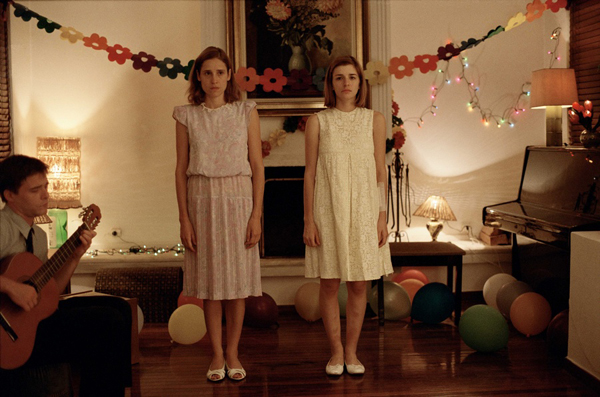Yorgos Lanthimos’s Dog Days

Yorgos Lanthimos’s Dogtooth (in theaters today) does not go down easily. Artfully executed, the disturbing story of a patriarch’s (Christos Stergioglou) perverse reach for authority is not intended for all audiences. Sex as service, strict edicts as sport, and the horrors of quarantine are only some of the film’s main psychological charges. And yet, despite these grave and estranging conceits, the 2009 Cannes winner of the Prix Un Certain Regard is a persuasive portrait of brash realism in an alternate world.
Set against a manicured home with white walls, trimmed hedges, chaste pinks, and ecru, an unnamed Greek family with two daughters and a son (Aggeliki Papoulia, Mary Tsoni, Hristos Passalis) live in absolute isolation. Only the father is permitted to leave the property. He returns with food—store-bought fish he later “hunts” with a speargun in the family swimming pool—and with Christina, the only named character (Anna Kalaitzidou), and a factory security guard he has hired to have sex with his son. The rules of the house are set and must be obeyed. Infractions are not tolerated, while compliance is awarded with tiny stickers that decorate the headboards of each adult child’s bed. Heretically detached from the outside world, the two daughters and son invent games to fight their boredom. The film’s darkest comedy occurs in these scenes: a competition to see who can remain self-anesthetized and passed out the longest; a race to catch a toy plane, perceived as real and to scale, that has fallen from the sky. Similarly, language is Newspeak-esque, debased and droll. “Zombies” are little yellow flowers that grow in the yard, a salt shaker is a “telephone,” and “pussy,” means “a big light.”
Of course, the family’s isolation is eventually challenged. Copies of Jaws and Rocky infiltrate the compound, triggering the older sister’s attempts to dissent. Lanthimos portrays his character’s unraveling without veering into prosaic teenage rebellion; hers is violent, puerile, sweaty, disturbed and quietly hysteric. Beautifully shot, Dogtooth paints the fallout of a caged and delusive upbringing. Stationary, faceless shots capture the siblings’ infantilized conversations and hints at their disenchantment as we watch two pairs of legs wearily pace back and forth in the bedroom. As with most dystopian narratives, shock and repulsion are often followed by realizations of parody and critique. The audience is suddenly in the throes as indirect–and perhaps unsought–surveillance.
DOGTOOTH OPENS TODAY. DAVID BYRNE INTRODUCES THE FILM AT NEW YORK’S CINEMA VILLAGE, 22 EAST 12 STREET, NEW YORK.






